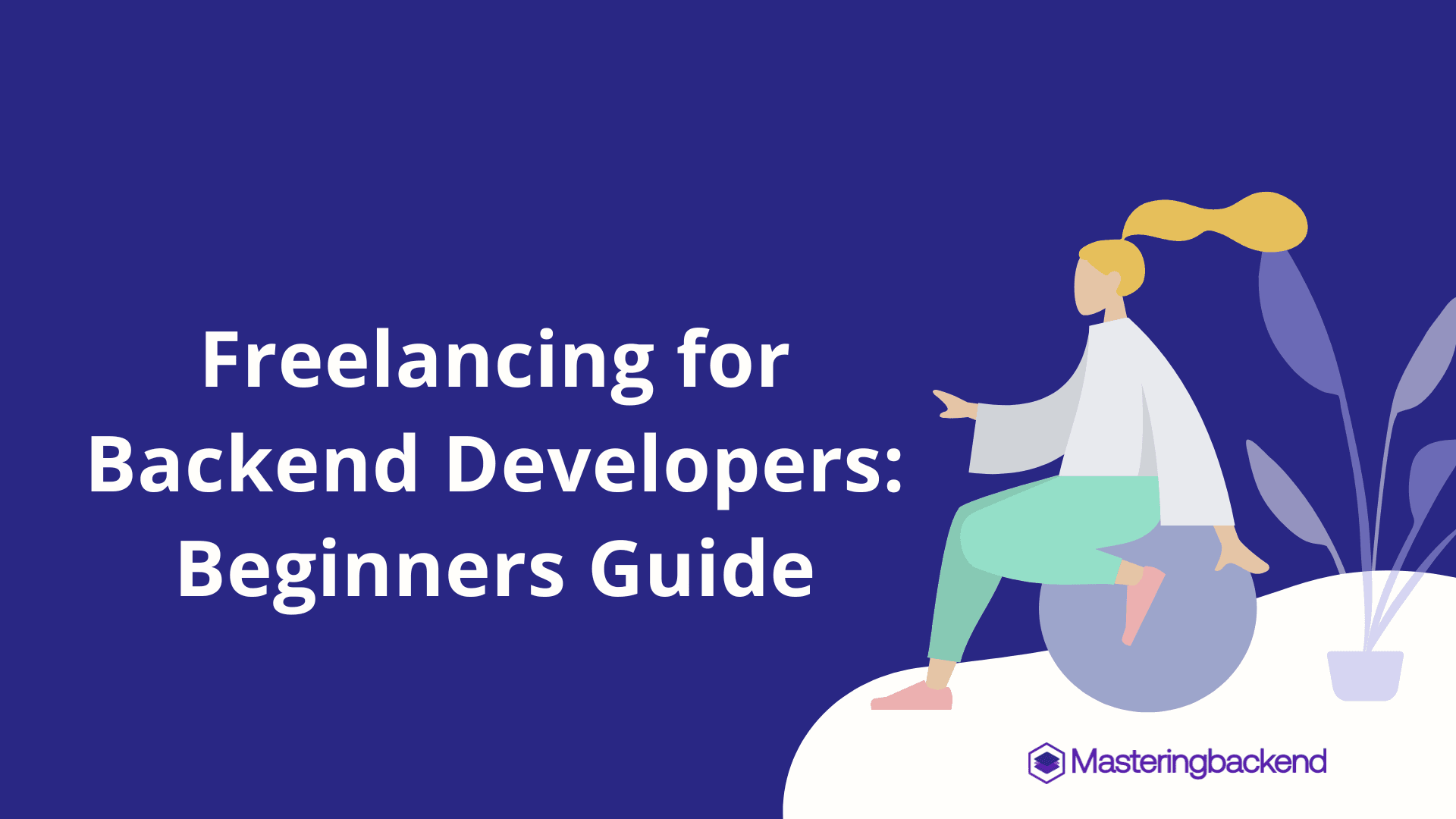Freelancing for Backend Developers is a venture with an awesome experience.
We’ll start by being honest. Backend developers are hot cake, and they are in high demand—which makes now, more than ever, an excellent time to consider a career in backend development.
So you’re just starting in backend development and want to explore opportunities in freelancing, or you are an experienced backend developer seeking a venture in freelancing, or you are just curious.
Whichever of these you are, this guide addresses your needs.
This guide discusses the foundations and best practices you need to know about backend development and freelancing for backend developers.
So here are five sections we would be covering in this post:
- The Basics: What backend development is?
- The skills needed to become a backend developer
- Soft Skills for Freelancing for Backend Developers
- How to get freelance jobs as a backend developer on online freelance platforms
- Connecting with clients outside online freelance platforms.
Before you dive in:
The Basics: What Backend Development Is?
Back-end development refers to the server-side of an application and everything that communicates between the database and the browser.
Hence, the back-end developer’s role is to collaborate with front-end developers by providing the server-side logic for outward-facing web application pieces.
In other words, they construct the logic that allows the web program to run effectively.
The Skills Needed to Become a Backend Developer
As a backend developer, your primary concern is site logic and performance.
So here are the skills you need to have in your toolbox:
- Expert understanding of backend programming languages and frameworks.
- Ability to manage a hosting environment, including database administration and application scaling to cope with traffic fluctuations.
- Experience with version control, such as Git, alongside knowledge of accessibility and security compliance.
To become a back-end developer, you can learn back-end languages like Java, PHP, Ruby on Rails, .NET, and Python.
Knowledge of front-end languages like HTML and CSS is not compulsory but can come in very handy.
There are online platforms—Coursera and Udemy—that have curriculums in the form of courses and boot camps (both paid and free) that you can enroll for and start learning.
Communication is also an essential skill because you would need to be able to understand the client, as well as give feedback amicably.
You can explore more on must-have skills for backend developers to give you more insight.
Soft Skills for Freelancing for Backend Developers
Just having the hard skills and knowing where to put out your service offerings is not enough to make money as a backend developer—you also need these soft skills in your toolbox:
Get a grasp of your worth
To make money as a backend developer, you need to understand how much your service is worth.
Knowing the monetary worth of the value you provide ensures you are not underbilling your clients and selling yourself short.
Then secondly, ensure to deliver on your promises. That is, high-value delivery should be your priority.
This will keep clients returning while also attracting new clients.
Treat your freelance business as you would a full-time traditional job
If you want your freelance career to take off, then you’ve got to treat it with formality and importance—like you would do a typical 9-5 job.
This would help you in several ways:
It would help you define your work-time distinct from your private time, cultivate good work habits, become more attentive and focused during your work-time, avoid distraction.
Lastly, get you to really sit down to define your goals, determine your work schedule, and map out your business growth journey.
Find time to eat and rest!
It would help if you had a clear mind to deliver high-quality results, so you don’t want to get swamped up for days in your work, neglecting your brain’s need for good food and sleep.
It is no news that a well-rested brain functions a lot much better than a fatigued one.
And the best way to set about creating your sleep time amidst your busy schedule is to draw up a to-do list for each day—plan your day.
A typical to-do list should outline all tasks for the day, including the allotted time for each of them—also, include eat-time and nap-time (if necessary).
This would, overall, improve your time management skills and, consequently, productivity.
Always be learning!
Growth is necessary for freelancers, as it increases the value of your offerings, which in turn scales up your earning potential—so learning is a must!
A proven path to keep you growing?
Invest in online courses and boot camps. Attend conferences, events, and online webinars designed for backend developers.
Then, join online communities for backend developers—where you get to network and interact with like minds that would help make you a better developer.
How to Get Freelance Jobs as a Backend Developer
A google search with the keyword ‘backend developer for hire’ would bring out adverts showing backend developers for hire.
These platforms are known as freelance platforms and help to connect clients to professionals.
To become a freelancer on an online freelancing platform is relatively easy and can be done in three steps;
- Sign Up/ Create an account
- Complete your profile
- Submit proposals for jobs posted on the platform
Some platforms that you can sign up on include: Freelancer, Upwork, Toptal, Topcoder, Zip recruiter, Rent a Coder, etc.
A few of these platforms would require you to undergo skill tests after signing up to verify you have the skillset to offer expert services in your chosen field.
For others, you would be required to upload a portfolio, submit proposals for jobs, and communicate with clients via apps or on-site.
Usually, clients state the rates they are willing to pay to get the job done upfront in the job description.
This is a good thing because it allows you to make good decisions. For instance, you can decide which work is worth your expertise, and you also get to craft your proposals properly, so you are offering your services rightly.
The general conception is that to get a job, and you need to start low on your rates: the low-pricing strategy.
This strategy might seem logically right—like low prices should attract, right?
But this strategy ignores something significant about your clients.
Your clients’ thinking is typically this way:
The higher your rates, the higher the perceived value of your services and expertise. So you want to factor in this when deciding on your pricing.
A quick tip, by the way, is to focus on good ratings as you start doing jobs—it will help you charge higher rates with confidence.
Connecting With Clients Outside Online Freelance Platforms
In the long run, you may want to get clients beyond online freelancing platforms—you want to start building your network of clients.
How do you go about this?
Have an amazing Portfolio:
Your Portfolio is a collection or display of the work that you have done.
Your portfolio should contain:
- Contact information that is simple to locate
- A concise bio
- Relevant experience
- Your skillset/relevant skills
- Projects that you have done
- Relevant social media information
- Your picture
- A downloadable resume
Even though you are not a designer, your portfolio should be visually appealing, reflect your personality, and, most importantly, function properly, as your portfolio is the first work that your client would be viewing.
Put yourself out there
Showing your expertise is an excellent way to put yourself out as a freelancer.
This can be in writing technical articles on backend development on platforms like Medium or Hashnode and sharing them on social media platforms such as Twitter or LinkedIn.
Or in the form of participation in technical discussions in online communities, helping to answer questions relating to backend development—ensure your social profile clearly states your expertise as a freelance backend developer.
With the footprints of your expertise through the articles and posts, people would naturally contact you or recommend you for a back-end development role when they need you or know someone who does.
Have Good Communication Skills
As mentioned earlier, communication is vital, as it would play a solid role in determining how you offer your services.
Also, how you ensure you deliver desired results—bad communication could harm you as lack of a good understanding of your client’s needs could result in wrong service offerings and bad deliveries!
Secondly, you should maintain a professional tone throughout with your client and ensure to communicate your thoughts clearly—and don’t assume anything, ask questions!
Pair up with a designer and a front-end developer
By teaming up with both a designer and a front-end developer, you increase the range of projects you can bid for—there are a limited number of job openings that require just backend development.
Most clients typically have no idea of how web development works or who does what, and they want a website! So pairing up is not only a good strategy.
It is the best strategy to getting jobs and projects.
Secondly, it saves the client the stress of searching for individual parties for each role—this also poses a downside effect to you.
Working with new people means you will have to adjust to fit in with new schedules each time you work with a new client.
This could waste a lot of time and could be very stressful—something that could be better avoided when you work with people you already have experience with.
Deliver Quality Work
Your work is a significant attraction to clients.
Word of mouth is a vital means through which you can gain more freelance projects.
If you deliver quality work, you would most likely get recommendations from clients you previously worked with—generating more leads and thus, directing new clients towards your business.
Conclusion
Freelancing for backend developers is very much possible, and this guide should serve as a starting point for your freelance journey.
It is, however, important to note that consistency is key, and improvement can only happen when you take note of the points stated above and consistently put them into practice.



